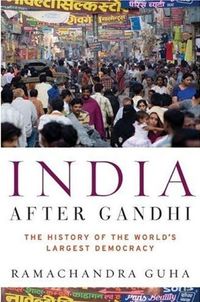

Purchase
The History of the World's Largest Democracy
Ecco
August 2007
On Sale: July 24, 2007
912 pages
ISBN: 0060198818
EAN: 9780060198817
Hardcover
Add to Wish List
Non-Fiction
Born against a background of privation and civil war,
divided along lines of caste, class, language and religion,
independent India emerged, somehow, as a united and
democratic country. This remarkable book tells the full
story—the pain and the struggle, the humiliations and the
glories—of the world's largest and least likely democracy. Ramachandra Guha writes compellingly of the myriad protests
and conflicts that have peppered the history of free India.
But he writes also of the factors and processes that have
kept the country together (and kept it democratic), defying
numerous prophets of doom who believed that its poverty and
heterogeneity would force India to break up or come under
autocratic rule. Once the Western world looked upon India
with a mixture of pity and contempt; now it looks upon India
with fear and admiration. Moving between history and biography, this story of modern
India is peopled with extraordinary characters. Guha gives
fresh insights on the lives and public careers of those
long-serving prime ministers Jawaharlal Nehru and Indira
Gandhi. There are vivid sketches of the major "provincial"
leaders whose province was as large as a European country:
the Kashmiri rebel turned ruler Sheikh Abdullah; the Tamil
film actor turned politician M. G. Rama-chandran; the Naga
secessionist leader Angami Zapu Phizo; the socialist
activist Jayaprakash Narayan. But the book also writes with
feeling and sensitivity about lesser known (though not
necessarily less important) Indians—peasants, tribals,
women, workers and musicians. Massively researched and elegantly written, India After
Gandhi is at once a magisterial account of India's rebirth
and the work of a major scholar at the height of his powers.
Comments
No comments posted.
Registered users may leave comments.
Log in or register now!
| 


 © 2003-2024 off-the-edge.net
all rights reserved Privacy Policy
© 2003-2024 off-the-edge.net
all rights reserved Privacy Policy